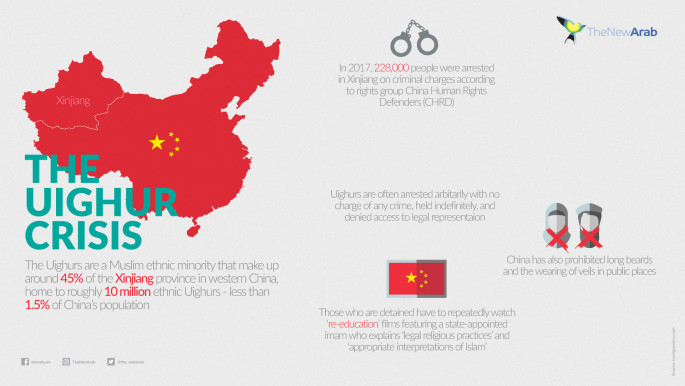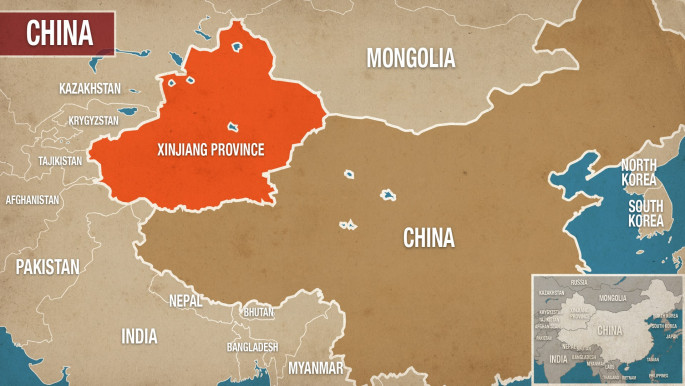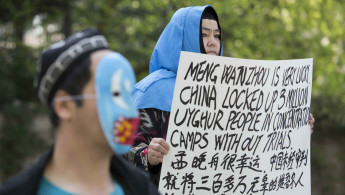Turkey's Erdogan says 'solution possible' for China's Uighur Muslims
Turkey is one of the only Muslim-majority countries to have criticised China over the detention of an estimated one million ethnic Uighurs and other mostly Muslim minorities in the Xinjiang province.
But Erdogan struck a softer tone after meeting Chinese President Xi Jinping on Tuesday in Beijing.
"I believe we can find a solution to the issue taking into account the sensitivities of both sides," Erdogan told Turkish journalists in Beijing before flying back to Turkey, according to Hurriyet daily.
Chinese state media claimed Erdogan said ethnic minorities live happily in Xinjiang, but he made no such comments to Turkish reporters.
He warned against those who sought to "abuse" the Xinjiang issue to create tensions with China, a key investor and trading partner.
"This abuse is having a negative impact on Turkish-Chinese relations. It is necessary that we do not give opportunity to such abuse," Erdogan said.
 |
He added that Turkey could "send a delegation to East Turkestan", the name given by activists to Xinjiang, and that Beijing was open to the idea.
China denies holding people against their will in what it describes as "vocational education centres" aimed at steering citizens away from religious extremism.
Turkey's foreign ministry in February lambasted China's treatment of Uighurs as "a great embarrassment for humanity" and said those in the centres and prisons were "subjected to torture and political brainwashing".
Other majority-Muslim countries have been silent on the issue. Saudi Crown Prince Mohamed bin Salman has been broadly criticised for putting Riyadh's relationship with Beijing about the rights of the Muslim minority.
When the crown prince met with Chinese President Xi Jinping in February he defended China's "right" to undertake "anti-terrorism" and "de-extremism" measures.
Explainer: China's persecution of Uighur Muslims
Following a flare-up in violence in 2014, Chinese authorities rolled out various draconian security measures in Xinjiang - from banning long beards and headscarves to placing up to a million residents in detention camps.
Those free from detention are said to live in what is essentially a testing ground for the world's most sophisticated high-tech surveillance methods.
Muslims in Xinjiang are barred from fasting during the Muslim holy month of Ramadan and have allegedly forced to drink alcohol and eat pork - both forbidden in Islam - in internment camps.
Rights groups and former inmates see the measures as part of a campaign to forcefully assimilate Uighurs and other minorities into the country's majority ethnic Han society, diluting their unique cultures and religious beliefs.
 |
Follow us on Twitter: @The_NewArab





 Follow the Middle East's top stories in English at The New Arab on Google News
Follow the Middle East's top stories in English at The New Arab on Google News
![The UAE is widely suspected of arming the RSF militia [Getty]](/sites/default/files/styles/image_330x185/public/2024-11/GettyImages-472529908.jpg?h=69f2b9d0&itok=Yauw3YTG)
![Netanyahu furiously denounced the ICC [Getty]](/sites/default/files/styles/image_330x185/public/2024-11/GettyImages-2169352575.jpg?h=199d8c1f&itok=-vRiruf5)
![Both Hamas and the Palestinian Authority welcomed the ICC arrest warrants [Getty]](/sites/default/files/styles/image_330x185/public/2024-11/GettyImages-2178351173.jpg?h=199d8c1f&itok=TV858iVg)